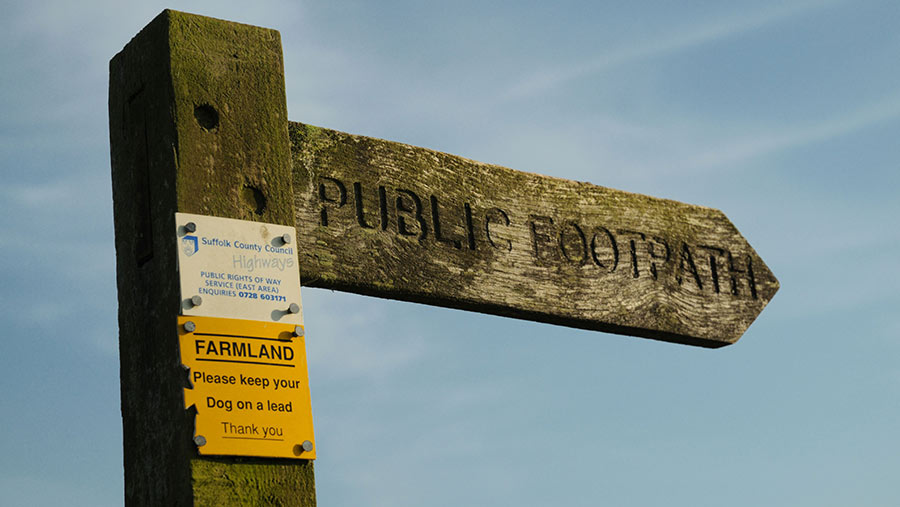Business Clinic: Can I cut off neighbour’s right of way?
 ©Andy Drysdale/Rex Shutterstock
©Andy Drysdale/Rex Shutterstock Farmers Weekly’s Business Clinic experts offer free advice on legal, finance, tax, insurance, farm management and land issues. Here David Quinn – Solicitor, Thrings – offers guidance on a rights of way problem.
Q: My neighbour has a right of way across my land to the highway. There are issues with contribution towards maintenance of the right of way and the neighbour leaving my gate open.
My neighbour has an alternative shorter route to the highway and I would like to know if I can terminate the right of way and insist they use the alternative route?
A: If the extent of a right of way is properly defined, the owner of the land over which the right of way passes cannot alter its route or insist on its removal without the consent of the person who benefits from the right ie. the neighbour above, or some other provisions permitting them to do so.
Leaving the gate open is a nuisance but unlikely to be something that would permit a landowner to terminate the right or to prevent the neighbour from using the right of way.
If there are security concerns or a risk of animals escaping, it would be sensible to confirm this in writing to the neighbour making them aware of the risks and potential liability. Locking the gate may also be an option but a key would need to be provided to the neighbour to ensure they can continue to use the right.
See also: Business Clinic – Do children qualify for tenancy succession?
In broad terms there is no obligation on parties to repair and maintain a right of way unless the parties have agreed to do so by express provision in the deeds or otherwise.
If the beneficiary of the right of way has contracted to contribute towards the repair and maintenance but is refusing to do so then there could be scope for the landowner to rely on a case called Halsall v Brizell [1957] Ch. 169 to prevent the neighbour using the right of way.
In that case the court held that a party cannot enjoy the benefit of the right without accepting the burden that goes with it, ie. the covenant to contribute towards the maintenance.
If the neighbour chooses to use the alternative shorter route as their primary access this could lead to the existing right of way being used less or not at all.
Unfortunately the courts have shown that this alone would not be sufficient reason to permit the landowner to terminate the right.
If the neighbour no longer intends using the right of way and is willing to release the right, this should be recorded in a deed of release.
You might want to discuss this with the neighbour to see if this could be agreed. This would confirm the release of the right and can be registered in the Land Registry. The right cannot be subsequently reinstated.
It seems here that the neighbour is actively using the right of way. However if they no longer intend using the right of way due to the existence of the alternative route, then in the longer term (and in the absence of a deed of release) the neighbour may be considered to have abandoned the right.
This is extremely difficult to prove and the courts have held that in order for an easement such as a right of way to be abandoned due to lack of use over time, it must be shown that the neighbour had a fixed intention to never, at any time in the future, assert the right to the easement or to attempt to transmit it to someone else – Tehidy Minerals Ltd v Norman [1971] 2 QB 528.
The cessation of use over the long period of time must be coupled with the necessary intention so the neighbour’s potential use of an alternative route will not of itself be sufficient to prove a fixed intention never to use the right in the future.
This advice is in general terms only and I would stress that any dispute involving rights of way (including termination of rights of way) requires a detailed review of the relevant deeds before embarking on formal legal action.
Do you have a question for the panel?
Outline your legal, tax, finance, insurance or farm management question in no more than 350 words and Farmers Weekly will put it to a member of the panel. Please give as much information as possible.
Send your enquiry to Business Clinic, Farmers Weekly, RBI, Quadrant House, The Quadrant, Sutton, Surrey SM2 5AS.
You can also email your question to fwbusinessclinic@rbi.co.uk or post it on the Farmers Weekly website.


